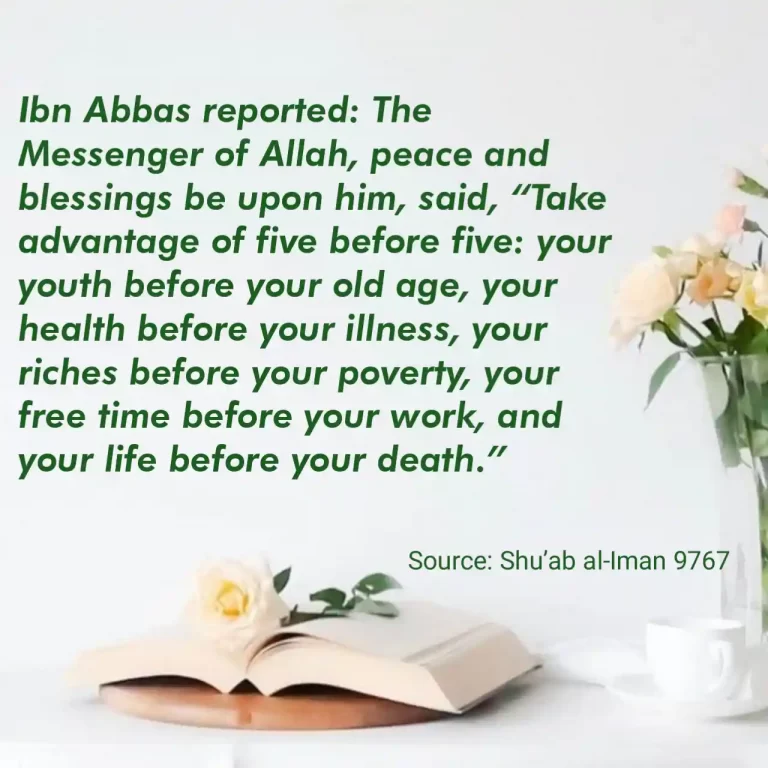15 Hadith About Character In English And Arabic Text
Good character, morals, ethics, and manners are fundamental to the religion of Islam and the means by which we can achieve salvation in the life to come. Good character is a major theme in the teachings of the Quran and the traditions of the Prophet, SallAllahu Alayhi Wa Sallam.
Advertisements
Continue reading to find some hadith about character and good character in Arabic text and their meaning in English.
The believers with the most complete faith, who are most beloved by Allah, Subhanahu Wa Ta’ala, and His Messenger, SallAllahu Alayhi Wa Sallam, are those with the best character.
Hadith About Character In English And Arabic
This is a compilation of 16 ahadith on building good character. There are actually a lot more ahadith about this topic but these are some from Bukhari and Muslim.
1. Hadith
Nawwas b. Sam’an al-Ansari reported: I asked Allah’s Messenger (ﷺ) about virtue and vice. He said: Virtue is a kind disposition and vice is what rankles in your heart and that you disapprove that people should come to know of it.
Advertisements
Arabic
عَنِ النَّوَّاسِ بْنِ سَمْعَانَ الأَنْصَارِيِّ، قَالَ سَأَلْتُ رَسُولَ اللَّهِ صلى الله عليه وسلم عَنِ الْبِرِّ وَالإِثْمِ فَقَالَ” الْبِرُّ حُسْنُ الْخُلُقِ وَالإِثْمُ مَا حَاكَ فِي صَدْرِكَ وَكَرِهْتَ أَنْ يَطَّلِعَ عَلَيْهِ النَّاسُ ”
2. Hadith
Abdullah ibn Amr reported: The Messenger of Allah, peace and blessings be upon him, said: Whoever would love to be delivered from Hellfire and admitted into Paradise, let him meet his end with faith in Allah and the Last Day, and let him treat people as he would love to be treated.
Arabic
مَنْ أَحَبَّ أَنْ يُزَحْزَحَ عَنْ النَّارِ وَيَدْخُلَ الْجَنَّةَ فَلْتُدْرِكْهُ مَنِيَّتُهُ وَهُوَ يُؤْمِنُ بِاللَّهِ وَالْيَوْمِ الْآخِرِ وَيَأْتِي إِلَى النَّاسِ مَا يُحِبُّ أَنْ يُؤْتَى إِلَيْهِ
Full Hadith Source: Muslim 1844
Advertisements

3. Hadith
Abdullah bin ‘Amr narrated that the Messenger of Allah said: “The merciful are shown mercy by Ar-Rahman. Be merciful on the earth, and you will be shown mercy from Who is above the heavens. The womb is named after Ar-Rahman, so whoever connects it, Allah connects him, and whoever severs it, Allah severs him.”
Arabic
عَنْ عَبْدِ اللَّهِ بْنِ عَمْرٍو، قَالَ قَالَ رَسُولُ اللَّهِ صلى الله عليه وسلم” الرَّاحِمُونَ يَرْحَمُهُمُ الرَّحْمَنُ ارْحَمُوا مَنْ فِي الأَرْضِ يَرْحَمْكُمْ مَنْ فِي السَّمَاءِ الرَّحِمُ شُجْنَةٌ مِنَ الرَّحْمَنِ فَمَنْ وَصَلَهَا وَصَلَهُ اللَّهُ وَمَنْ قَطَعَهَا قَطَعَهُ اللَّهُ”
Jami` at-Tirmidhi 1924, Grade: Hasan (Darussalam)
Advertisements
4. Hadith
Abu Huraira reported it was said to Allah’s Messenger (ﷺ): Invoke curse upon the polytheists, whereupon he said: I have not been sent as the invoker of curse, but I have been sent as mercy.”
Arabic
عَنْ أَبِي هُرَيْرَةَ، قَالَ قِيلَ يَا رَسُولَ اللَّهِ ادْعُ عَلَى الْمُشْرِكِينَ قَالَ” إِنِّي لَمْ أُبْعَثْ لَعَّانًا وَإِنَّمَا بُعِثْتُ رَحْمَةً ” .
Read also Charity Does Not Decrease Wealth Hadith In Arabic And Meaning
5. Hadith
‘Abdullah narrated that the Messenger of Allah said: “The believer does not insult the honor of others, nor curse, nor commit Fahishah, nor is he foul.”
Arabic
عَنْ عَبْدِ اللَّهِ، قَالَ قَالَ رَسُولُ اللَّهِ صلى الله عليه وسلم “ لَيْسَ الْمُؤْمِنُ بِالطَّعَّانِ وَلاَ اللَّعَّانِ وَلاَ الْفَاحِشِ وَلاَ الْبَذِيءِ”.
Jami` at-Tirmidhi 1977, Grade: Hasan (Darussalam)
6. Hadith About Good Character
Narrated ‘Abdullah bin ‘Amr: A person asked Allah’s Messenger (ﷺ). “What (sort of) deeds in or (what qualities of) Islam are good?” He replied, “To feed (the poor) and greet those whom you know and those whom you don’t know.”
Arabic
عَنْ عَبْدِ اللَّهِ بْنِ عَمْرٍو، أَنَّ رَجُلاً، سَأَلَ رَسُولَ اللَّهِ صلى الله عليه وسلم أَىُّ الإِسْلاَمِ خَيْرٌ قَالَ” تُطْعِمُ الطَّعَامَ، وَتَقْرَأُ السَّلاَمَ عَلَى مَنْ عَرَفْتَ وَمَنْ لَمْ تَعْرِفْ”.
7. Hadith
It Is narrated on the authority of Abdullah b. Mas’ud that the Messenger of Allah (ﷺ), observed:
He who has in his heart the weight of a mustard seed of pride shall not enter Paradise. A person (amongst his hearers) said: Verily a person loves that his dress should be fine, and his shoes should be fine. He (the Holy Prophet) remarked: Verily, Allah is Graceful and He loves Grace. Pride is disdaining the truth (out of self-conceit) and contempt for the people.
Arabic
عَنْ عَبْدِ اللَّهِ بْنِ مَسْعُودٍ، عَنِ النَّبِيِّ صلى الله عليه وسلم قَالَ ” لاَ يَدْخُلُ الْجَنَّةَ مَنْ كَانَ فِي قَلْبِهِ مِثْقَالُ ذَرَّةٍ مِنْ كِبْرٍ ” . قَالَ رَجُلٌ إِنَّ الرَّجُلَ يُحِبُّ أَنْ يَكُونَ ثَوْبُهُ حَسَنًا وَنَعْلُهُ حَسَنَةً . قَالَ ” إِنَّ اللَّهَ جَمِيلٌ يُحِبُّ الْجَمَالَ الْكِبْرُ بَطَرُ الْحَقِّ وَغَمْطُ النَّاسِ
Sahih Muslim 91
8. Hadith
‘A’isha, the wife of Allah’s Apostle (ﷺ), reported that Allah’s Messenger (ﷺ) said: ‘A’isha, verily Allah is kind and He loves kindness and confers upon kindness which he does not confer upon severity and does not confer upon anything else besides it (kindness).
Arabic
عَنْ عَائِشَةَ، زَوْجِ النَّبِيِّ صلى الله عليه وسلم أَنَّ رَسُولَ اللَّهِ صلى الله عليه وسلم قَالَ” يَا عَائِشَةُ إِنَّ اللَّهَ رَفِيقٌ يُحِبُّ الرِّفْقَ وَيُعْطِي عَلَى الرِّفْقِ مَا لاَ يُعْطِي عَلَى الْعُنْفِ وَمَا لاَ يُعْطِي عَلَى مَا سِوَاهُ ” .
Sahih Muslim 2593
9. Hadith
Narrated `Adi bin Hatim: The Prophet (ﷺ) said, “Protect yourself from the Fire.” He then turned his face aside (as if he were looking at it) and said again, “Protect yourself from the Fire,” and then turned his face aside (as if he were looking at it), and he said so for the third time till we thought he was looking at it.
He then said, “Protect yourselves from the Fire, even if with one half of a date and he who hasn’t got even this, (should do so) by (saying) a good, pleasant word.’
Arabic
عَنْ عَدِيِّ بْنِ حَاتِمٍ، قَالَ قَالَ النَّبِيُّ صلى الله عليه وسلم ” اتَّقُوا النَّارَ ”. ثُمَّ أَعْرَضَ وَأَشَاحَ، ثُمَّ قَالَ ” اتَّقُوا النَّارَ ”. ثُمَّ أَعْرَضَ وَأَشَاحَ ثَلاَثًا، حَتَّى ظَنَنَّا أَنَّهُ يَنْظُرُ إِلَيْهَا، ثُمَّ قَالَ ” اتَّقُوا النَّارَ وَلَوْ بِشِقِّ تَمْرَةٍ، فَمَنْ لَمْ يَجِدْ فَبِكَلِمَةٍ طَيِّبَةٍ ”.
Sahih al-Bukhari 6540
Related 4 Hadith On Suhoor In Arabic And Meaning In English.
10. Hadith
Narrated Abu As-Sawar Al-Adawi:Imran bin Husain said: The Prophet (ﷺ) said, “Haya’ (pious shyness from committing religeous indiscretions) does not bring anything except good.”
Thereupon Bashir bin Kab said, ‘It is written in the wisdom paper: Haya’ leads to solemnity; Haya’ leads to tranquility (peace of mind).” `Imran said to him, “I am narrating to you the saying of Allah’s Messenger (ﷺ) and you are speaking about your paper (wisdom book)?”
Arabic
عَنْ أَبِي السَّوَّارِ الْعَدَوِيِّ، قَالَ سَمِعْتُ عِمْرَانَ بْنَ حُصَيْنٍ، قَالَ قَالَ النَّبِيُّ صلى الله عليه وسلم” الْحَيَاءُ لاَ يَأْتِي إِلاَّ بِخَيْرٍ ”. فَقَالَ بُشَيْرُ بْنُ كَعْبٍ مَكْتُوبٌ فِي الْحِكْمَةِ إِنَّ مِنَ الْحَيَاءِ وَقَارًا، وَإِنَّ مِنَ الْحَيَاءِ سَكِينَةً. فَقَالَ لَهُ عِمْرَانُ أُحَدِّثُكَ عَنْ رَسُولِ اللَّهِ صلى الله عليه وسلم وَتُحَدِّثُنِي عَنْ صَحِيفَتِكَ.
Sahih al-Bukhari 6117

11. Hadith
It was narrated from Abu Hurairah that: The Messenger of Allah [SAW] said: “The Muslim is the one from whose tongue and hand the people are safe, and the believer is the one from whom the people’s lives and wealth are safe.”
Arabic
عَنْ أَبِي هُرَيْرَةَ، عَنْ رَسُولِ اللَّهِ صلى الله عليه وسلم قَالَ “ الْمُسْلِمُ مَنْ سَلِمَ النَّاسُ مِنْ لِسَانِهِ وَيَدِهِ وَالْمُؤْمِنُ مَنْ أَمِنَهُ النَّاسُ عَلَى دِمَائِهِمْ وَأَمْوَالِهِمْ ” .
Sunan an-Nasa’i 4995 Grade: Sahih

12. Hadith
Narrated Abu Huraira: Allah’s Messenger (ﷺ) said, “The strong is not the one who overcomes the people by his strength, but the strong is the one who controls himself while in anger.”
Arabic
عَنْ أَبِي هُرَيْرَةَ ـ رضى الله عنه ـ أَنَّ رَسُولَ اللَّهِ صلى الله عليه وسلم قَالَ “ لَيْسَ الشَّدِيدُ بِالصُّرَعَةِ، إِنَّمَا الشَّدِيدُ الَّذِي يَمْلِكُ نَفْسَهُ عِنْدَ الْغَضَبِ ”.
Sahih al-Bukhari 6114
13. Hadith
Narrated An-Nu`man bin Bashir: Allah’s Messenger (ﷺ) said, “You see the believers as regards their being merciful among themselves and showing love among themselves and being kind, resembling one body, so that, if any part of the body is not well then the whole body shares the sleeplessness (insomnia) and fever with it.”
Arabic
قَالَ سَمِعْتُهُ يَقُولُ سَمِعْتُ النُّعْمَانَ بْنَ بَشِيرٍ، يَقُولُ قَالَ رَسُولُ اللَّهِ صلى الله عليه وسلم” تَرَى الْمُؤْمِنِينَ فِي تَرَاحُمِهِمْ وَتَوَادِّهِمْ وَتَعَاطُفِهِمْ كَمَثَلِ الْجَسَدِ إِذَا اشْتَكَى عُضْوًا تَدَاعَى لَهُ سَائِرُ جَسَدِهِ بِالسَّهَرِ وَالْحُمَّى ”.
Sahih al-Bukhari 6011
14. Hadith
‘Abdullah reported Allah’s Messenger (ﷺ) as saying: Truth leads one to Paradise and virtue leads one to Paradise and the person tells the truth until he is recorded as truthful, and lie leads to obscenity and obscenity leads to Hell, and the person tells a lie until he is recorded as a liar.
Arabic
عَنْ عَبْدِ اللَّهِ، قَالَ قَالَ رَسُولُ اللَّهِ صلى الله عليه وسلم” إِنَّ الصِّدْقَ يَهْدِي إِلَى الْبِرِّ وَإِنَّ الْبِرَّ يَهْدِي إِلَى الْجَنَّةِ وَإِنَّ الرَّجُلَ لَيَصْدُقُ حَتَّى يُكْتَبَ صِدِّيقًا وَإِنَّ الْكَذِبَ يَهْدِي إِلَى الْفُجُورِ وَإِنَّ الْفُجُورَ يَهْدِي إِلَى النَّارِ وَإِنَّ الرَّجُلَ لَيَكْذِبُ حَتَّى يُكْتَبَ كَذَّابًا ”
Sahih Muslim 2607
15. Hadith
Abu Huraira reported Allah’s Messenger (ﷺ) as saying: Do you know who is poor? They (the Companions of the Holy Prophet) said: A poor man amongst us is one who has neither dirham with him nor wealth.
He (the Holy Prophet) said: The poor of my Umma would be he who would come on the Day of Resurrection with prayers and fasts and Zakat but (he would find himself bankrupt on that day as he would have exhausted his funds of virtues) since he hurled abuses upon others, brought calumny against others and unlawfully consumed the wealth of others and shed the blood of others and beat others, and his virtues would be credited to the account of one (who suffered at his hand).
And if his good deeds fall short to clear the account, then his sins would be entered in (his account) and he would be thrown in the Hell-Fire.
Arabic
عَنْ أَبِي هُرَيْرَةَ، أَنَّ رَسُولَ اللَّهِ صلى الله عليه وسلم قَالَ ” أَتَدْرُونَ مَا الْمُفْلِسُ” . قَالُوا الْمُفْلِسُ فِينَا مَنْ لاَ دِرْهَمَ لَهُ وَلاَ مَتَاعَ . فَقَالَ ” إِنَّ الْمُفْلِسَ مِنْ أُمَّتِي يَأْتِي يَوْمَ الْقِيَامَةِ بِصَلاَةٍ وَصِيَامٍ وَزَكَاةٍ وَيَأْتِي قَدْ شَتَمَ هَذَا وَقَذَفَ هَذَا وَأَكَلَ مَالَ هَذَا وَسَفَكَ دَمَ هَذَا وَضَرَبَ هَذَا فَيُعْطَى هَذَا مِنْ حَسَنَاتِهِ وَهَذَا مِنْ حَسَنَاتِهِ فَإِنْ فَنِيَتْ حَسَنَاتُهُ قَبْلَ أَنْ يُقْضَى مَا عَلَيْهِ أُخِذَ مِنْ خَطَايَاهُمْ فَطُرِحَتْ عَلَيْهِ ثُمَّ طُرِحَ فِي النَّارِ
Sahih Muslim 2581
Good conduct comes into play in relationship with Allah and the slaves of Allah.
Read also Tasbih Fatima Benefits And FULL Hadith
As for good conduct with Allah – the Mighty and Sublime, this entails pleasure at His Judgements, in Legislation and Predestination, accepting them wholeheartedly without ill feelings or despair.
When Allah decrees something for a Muslim, though it might not be pleasing to him, he should accept it and remain patient, and he should say with his tongue and heart: ‘I am pleased with Allah as Lord’.
And when Allah legislates a particular ruling, he should be pleased with it, accept it and willing to execute the legislation of Allah – the Mighty and Sublime – wholeheartedly with tranquillity of the mind.
This is good conduct with Allah – the Mighty and Sublime.
As for good conduct with the slaves, he should be good to them, as some scholars have explained that it means refraining from doing evil to them, rendering assistance, showing cheerful face and similar things. This is good conduct.
A person refraining from committing evil implies not hurting people with his tongue or his limbs; rendering assistance implies that he is willing to expend his wealth, knowledge, honour and material and immaterial properties for others.
Showing a cheerful face means meeting people with a smile, not a grim look, and not turning away his cheek. This is good conduct.
There is no doubt that whoever does all these- he does not harm people, he gives helping hand to others and meets them with a cheerful face- would show patience in the face of harm from others.
And there is no doubt that being patient on peoples harm is part of good conduct.
A person might hurt his brother, perhaps he transgresses against him by taking his wealth illegally, and denying him of his right or similar actions, but the victim remains patient on this harm and seeks reward through that.
Verily the good end is for the pious. These are examples of good conduct.
Allah – the Mighty and Sublime – to His Messenger SAW:
“And verily, you (O Muhammad) are on an exalted standard of character”
Surah Al-Qalam: 4
You, O Muhammad SAW, are excellent in character; none has ever possessed the kind of your character, in all forms.
You demonstrate good traits in dealings with Allah – the Mighty and Sublime- and in dealings with His slaves; this include valour, generosity, good interactions with people and in all affairs.
The Prophets character is the Qur’an in reality. He would implement its lessons, applying its commandments and eschewing its prohibitions.
Advertisements







